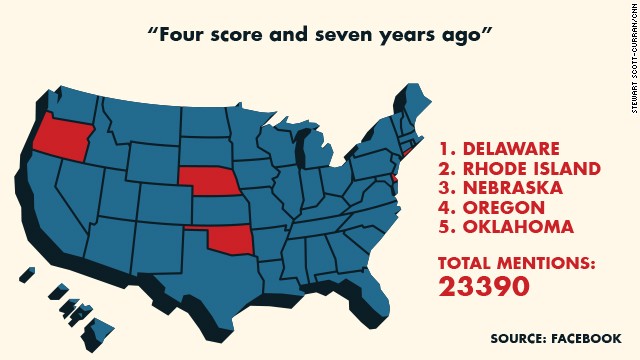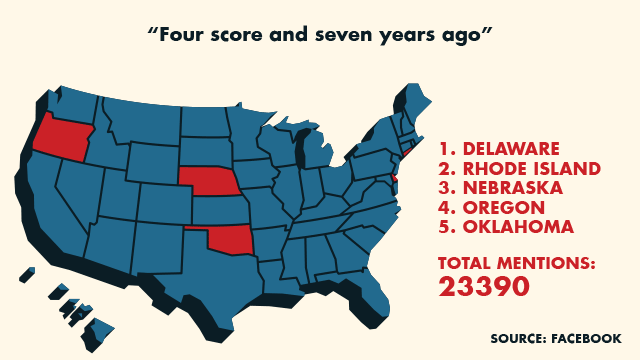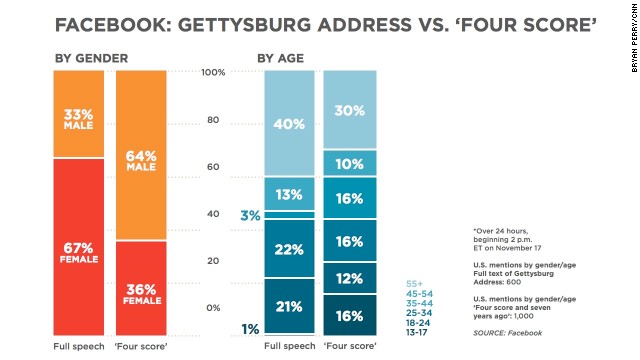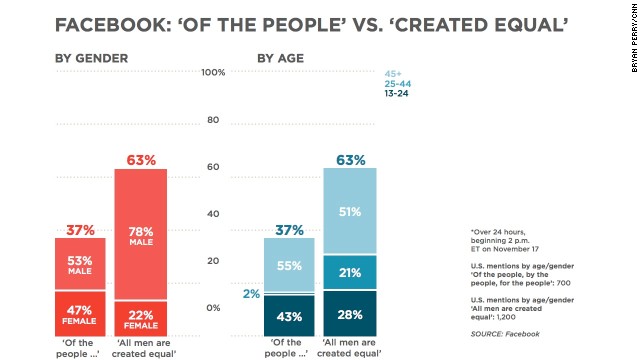(CNN) -- The Gettysburg Address was a quick-hitting speech that was built to last.
Length: A little over two minutes.
Message: Stay the course of a difficult war. If Democracy won't work here, it won't work anywhere.
Short enough to
comfortably fit into a social media status box, and shared in its
entirety hundreds of times every day, according to recent data from Facebook. Memorable phrases are quoted even more often.
It has been 150 years
since President Abraham Lincoln got up in front of thousands of people
in Gettysburg, Pennsylvania, to dedicate the Soldiers' National Cemetery
at a turning point in the Civil War.
His words are some of the
most memorable in American history, forever stamping our collective
minds with "four score and seven years ago," and "all men are created
equal," and of course a "government of the people, by the people, for
the people." Some of this wasn't really his coinage, but we'll get into
that later.
 View graphic frame-by-frame
View graphic frame-by-frame
Politicians portrayed themselves differently in Lincoln's day, seeking to give a more powerful kind of impression, said Dennis Baron, a professor of English and linguistics at the University of Illinois at Urbana-Champaign.
These
charts show the number of times phrases from the Gettysburg Address
were mentioned on Facebook over one week beginning November 6, and the
top five states for each. Northern and transplant states appeared to
rank higher.
"If you did that today, people would think of you as somehow flowery and old-fashioned and ... why are you doing that?"
The modern trend is for
leaders to "play the folksy card," Baron said, portraying themselves as
ordinary Joes and Janes who are exactly like you in every way -- except
for the fact that they are hoping to achieve a position of immense
power.
Baron said the last
president with an "oratorial" style -- on the whole -- was probably John
F. Kennedy, who was assassinated 100 years and three days after the
delivery of the Gettysburg Address. We still remember Kennedy's delivery
of lines like, "Ask not what your country can do for you; ask what you
can do for your country."
Lincoln was able to get
straight to the point and deliver a punchy speech in part because he
came after Edward Everett's marathon presentation about the war,
explains James Cornelius, curator of the Lincoln Collection in the Abraham Lincoln Presidential Library and Museum.
Lincoln had no speechwriter. Today, most politicians have at least some help preparing their words.
Everett had been the
main attraction, but Lincoln's speech started picking up steam afterward
and seemed to "go viral" in the manner of its day. Newspapers wrote
about the speech. In some cities, people could buy commemorative event
pamphlets that contained the speech, and key phrases were incorporated
into Lincoln's 1864 election posters and memorials after his death.
Sound familiar?
Cornelius said overall, Civil War-era America was a consumer-driven
society that had a few things in common with our Internet-saturated
world.
One can only imagine the tweets that would have been written about such a speech in modern times.
 'Lincoln' delivers Gettysburg Address
'Lincoln' delivers Gettysburg Address
"OMG. Lincoln just said in two minutes what Everett tried to say in two hours. #NailedIt #Boom"
Today, children learn
the address in school, especially in Northern cities, and documentary
guru Ken Burns is asking people to record themselves saying the speech
from memory.
People also share the
quotations on social media. Certain phrases seem to stick out, and
Facebook numbers show which ones we like to share. We found that people
in some states, like Delaware, were particularly fond of quoting the
address and that different parts of the speech were more popular in some
states than others.
Here is a nonexhaustive rundown of some of the most popular phrases in the speech, in order of appearance.
'Four score and seven years ago'
Pretty much everyone
knows this part of the Gettysburg Address, even if they think a score is
just something from sports. But no, in this case a score is 20 of
something. Here, a span of 20 years.
This line is a bit of an
inside remark shared with the audience, believed by most historians to
be a reference to Psalm 90:10, which most people of the day would know
is an allusion to the human lifespan.
"The days of our years
are threescore years and 10," says the psalm. "And if by reason of
strength they be fourscore years, yet is their strength labor and
sorrow; for it is soon cut off, and we fly away."
The
Gettysburg Address is short enough to share in its entirety. This chart
shows the differences between who shared the whole speech and the first
few words of it November 17-18. There is a sharp gender difference.
Cornelius said Lincoln
used such phrasing as a subtle reminder that the nation was only a
youthful 87 years old. Lincoln felt the United States was setting an
example for the world, and he didn't want the experiment in democracy to
fail.
"He's a little bit
worried that the nation might die at about the average lifespan that a
human would," Cornelius said. "He's putting forth straightforward
political terms in a poetic way."
That, and people tend to remember the beginnings of speeches, Cornelius said.
'All men are created equal'
More clever wordplay is at work in this famous quotation.
"In his call for
democracy and equality, (Lincoln) doesn't mention slavery, but everyone
knew that was what he was talking about," Cornelius said.
See what he did there?
This phrase can be interpreted as both an allusion to the principles of
the Declaration of Independence and also as a not-so-subtle jab at the
institution of slavery.
Little doubt exists that
Lincoln opposed slavery, and in fact loathed it, Cornelius said.
Slavery was at the heart of the war. Lincoln struggled with how to go
about eliminating it, and had to be convinced by legal thinkers and
abolitionists that he had the governmental power to tackle it.
'These dead shall not have died in vain'
Something about this part of the speech may be touching a nerve somewhere.
This part was the
second-most-mentioned phrase in the entire speech, rivaling "four score
and seven years ago" in popularity, despite the fact that it's not a
particularly well-known part of the Gettysburg Address.
But Lincoln can't take
full credit for this phrase, Cornelius said, because it was a fairly
common expression used in the parlance of war. It speaks to a need for
soldiers' deaths to mean something, if they must occur -- a timeless
desire we echo today.
"This is always a
problem in warfare. Why should any other people die? There is always a
percentage of the population that will make that argument at a certain
point. Lincoln's contrary point was that they died defending you. They
felt so strongly about the right of the cause. They felt so strongly
about preserving the union and ending slavery that you should not let
their efforts carry into the wind. You should continue on and further
this effort."
Another phrase from the
same section of the speech was also frequently cited: "It is rather for
us to be here dedicated to the great task remaining before us."
The takeaway here is persistence in the face of adversity.
Two
of the more demographically divergent phrases in the Gettysburg Address
are "of the people, by the people, for the people" and "all men are
created equal," judging by Facebook data from November 17-18.
'Government of the people, by the people, for the people'
This famous phrase, as
well as the few words immediately before and after it, got lots of
mentions on Facebook. Baron pointed out that anything at the end or
beginning of a speech is probably automatically more memorable. It
doesn't hurt if a speech is structured to enhance this effect, either.
It's such a beloved word
grouping that numerous people have borrowed it, massaged it and
restated it with a slightly different twist, like a game of telephone in
an era without telephones.
Cornelius said
historians trace this part back to Daniel Webster, a senator and U.S.
secretary of state before the Civil War. Webster's words were, "The
people's government, made for the people, made by the people and
answerable to the people."
It was later repurposed
by the abolitionist minister Theodore Parker, who talked about a
"government of all the people, by all the people, for all the people."
Even Lincoln himself is said to have used a version of the phrase in a letter 20 years before the address, Cornelius said.
Cornelius said the key
to the power of this phrase is in its skillful use of repetition. The
point of "people" is driven straight into your mind by its frequent
mention. That's why so many people have recycled it over the years.
Fast-forward to today, and we're still sharing all the phrases above.
Cornelius said one can
see the endurance of Lincoln's speaking legacy by taking a stroll into
the Lincoln library's gift shop, where you can pick up your very own
T-shirt with a Lincoln quotation on it. One recently released item has
the whole text printed on it.
Lincoln's speech endures
like few others, especially in our everyman-politician era. Maybe
that's why people can't help but post the speech on social media, 150
years after the fact.
Why do you think the
Gettysburg Address endures today, and why do some lines seem to resonate
more with different places and groups in the United States? Share your thoughts in the comments below.
Source: http://edition.cnn.com





